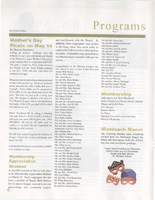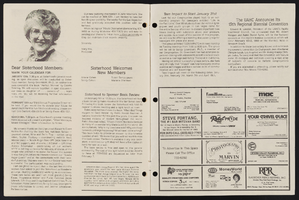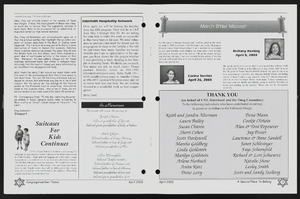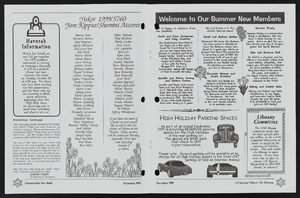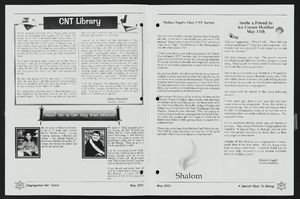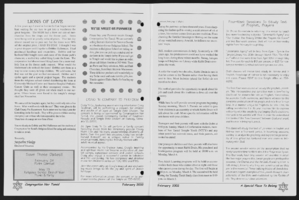Search the Special Collections and Archives Portal
Search Results

Transcript of interview with Stella Butterfield by Joanne Goodwin, October 14 & October 25, 2005
Date
Archival Collection
Description
Interviewed by Joanne L. Goodwin. Stella Butterfield's family, the Goldbergs, was Jewish, and she was born in the Bronx. During World War II she worked for the Coast Guard in the steno pool in Washington, D.C. Stella moved to Santa Monica a few years later while the war was still going on and worked briefly as a riveter for Douglas Aircraft and then as a teletype operator for the Air Force but at Douglas Aircraft. Because she had a hard time getting a job because of antisemitism, she changed her name to Gilbert. In December of 1948 she went to the Canal Zone in Panama to be the secretary of the commanding officer of the Panama Supply Depot. Stella was also a law reporter for court martials. She met Frank Butterfield, who was stationed there, and married him in 1952. He was transferred back to the United States, and they lived in Massachusetts. Then they moved to Los Angeles, and in 1953 they moved to Las Vegas, where she was a court reporter at Nellis Air Force Base. Then they moved to Mexico City, then back to California where she worked as a legal secretary. In early 1955 they moved back to Las Vegas, and Stella worked as a federal court reporter for Judge Roger T. Foley.
Text

Transcript of interview with Alice Thiriot Waite by Carole Terry and Donna Andress, October 19, 2011
Date
Archival Collection
Description
The memories and recollections of Alice Thiriot Ballard Waite provide a most interesting look at both at the Junior League of Las Vegas in the 1970s and the early days of Las Vegas. Alice recalls her childhood and young adult years after she arrived in Las Vegas at the age of five, giving the reader a rare picture of Las Vegas in the 1950s and 1960s. She was most active in the volunteer community of Las Vegas and served as Junior League President in 1964-5. Her reminiscences about the events and activities during the years while she was a Junior League member are an invaluable insight into its history. The exhibits she is sharing are an important documentation of those years after the Service League became the Junior League. She herself was a forerunner of today's Active members because she was a single, working mother while serving as the first "professional" President of the League.
Text

Transcript of interview with Mary Shaw by Barbara Tabach, September 2, 2011
Date
Archival Collection
Description
For the first 19 years of her life, Mary Martell Shaw called Central America home. Then thanks to misrouted luggage, she met the love of her life Rollin H. Shaw, a civil engineer, at a time in when his atomic energy career was taking off. In October 1943, they married in Costa Rica and for the next two decades traversed the country: Hawaii to California to Panama—wherever a project required Ronnie's engineering skills. Mary supported her husband every step of the way, with every new location. As a traditional homemaker of the era, she became adept at raising their four kids while packing boxes, enrolling them in school and setting up a warm home wherever they landed. The move to Las Vegas in September 1964, however, left her a bit challenged: there was a shortage of adequate housing, a concern for where to send her two daughters and two sons to school, and the feeling that they wouldn't be here long. Years later, Mary and Ronnie would retire to the city where their roots ran deepest, Las Vegas. With great wit, Mary recalls the long absences demanded by Ronnie's work with the Atomic Energy Commission. She also tells stories of the great fun they and their fellow Nevada Test Site employees had at parties, of her learning to paint with watercolors, and the pride she has of all her children's successes based on their education in Las Vegas.
Text


